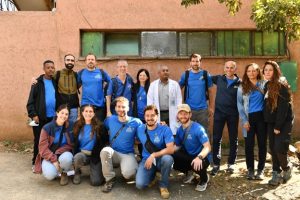
In addition to discharging their household responsibilities,women are the major labor contributors to the rural economy be it in crop production and animal husbandry. They engage in preparing land for farming, plowing, seed sawing and tending the seedling and protecting it from pest and weeds.
In the harvest season, they gather products, haul and put them in the traditional warehouse. All these activities are carried by their own at times borrowing helping hands from their husbands. The work is mostly labor intensive and hard. Nevertheless, the women technology utilization rate in this regard is only 27 percent.
Still worse, in a male-dominated society, women’s contribution to the economy is unrecognized and not valued in terms of money.
Hence, more has to be done in acknowledging their effort and enhancing the technology utilization.
Abduljelil Nassir is working in the Ministry of Agriculture (MOA)He is an expert in the Directorate of Women Children and Youth.
Recently in an interview with this writer he told the directorate that endeavors to support rural women through providing conducive technology which enables them to save their labor and time wasted in the drudgery of outmoded agricultural engagement.
He further said that, women toil both in pre and post harvest activities, spend huge labor and time but no one seems to accord them due credit. Cognizant of this tragic episode, in a bid to support them,the MOA has established the Agricultural Mechanization Directorate.
It sorts out the necessary technology. It as well studies a given technology’s affordability to farmers and its durability.
MoA took innovating the technology locally as the first option through the cooperation of technical colleges and importing them from abroad as a second option.
Currently, technologies which can be utilized for keeping bees and milking are locally are invented. The Ministry ofof Innovation Science and Technology is trying its level best to maximize the production and to scale up the distribution.
Technology helpful for skinning the local false banana stem to extract elements for food preparation also is in its experimental stage. The promotion work is underway.
It is known that in the densely populated area of Southern Nation Nationalities andState farmers extensively produce false banana which plays a crucial role in ensuring food and nutritional security in the time of drought. But skinning the stem for food preparation consumes women’s much time and labor and in effect create health hazard on them.
Technology helpful to separate maize from its cob or stem and Teff from its chaff is birthed. This saves farmers’ time. The technology is introduced but it has not reached the majority women.
On the other hand, to import the technology, the Ministry works in collaboration with companies and rural projects mainly focu s on supporting agriculture.
Imported technologies are vital in supporting rural women but they have also their own shortcomings.
Some technologies have short life span and maintaining the machine due to shortage of spare parts makes the matter very complicated. Moreover, lack of knowledge even in changing used motor oil among farmers is worrisome.Inability to read manuals for appropriate usage of the machines isalso a common problem.
In rural areas coming across non-functioning pumps and generators once used for irrigation is pervasive.
Huge gap is visible between the hard currency spent for the importation and the return from the machine and ultimately the situation takes women back to square one.
As to Abduljelil,to overcome the mentioned problems, the Ministry has directives which stipulate that before the importation of the technology precautionary measures have to be taken.Among others, it stresses providing sufficient training in how to utilize and maintain the machine to the users and inspecting sample technologies durability.
The instruction is applicable not only at federal level but also at states’ level.
The other thing that should be noticed in this regard is that,the promotion of technology in the rural parts should go in line with the social norm prevailing in the society.
As male-dominated society, every step which takes place to support women should get the confirmation of the head of the household.That is to say, the husband (breadwinner). Denying this situation might put in question the very essence of the objective. Therefore, adopting inclusive approach is recommendable.
Before utilizing the technology,awareness creation which considers the social norm should take place. When technologies that are solely utilized by women such as energy saving stoves and milking tools are introduced,men must be informed about the matter because the technology obligates the outlay of money deducted from meager family’s income.
Youth who usually support their mothers must also be informed.
According to the Ministry of agriculture’s recent report, about 30 percent of the product in rural parts of the country will be wasted duringpost-harvest period due to lack of sufficient technology and skills.
For the poor countries with subsistence economy like Ethiopiais’ the loss is unaffordable. The country incurs heavy loss and we canimagine theimpact on agricultural output nationwide. Hence,to manage the waste in the post-harvest process, introducing technology can be taken as a remedy.
But as to Abduljelil,as 90 percent of the farming is small scale and subsistence, making use of combiner s and tractors is not feasible.
In such situations women are forced to heavily deploy their labor and time in collecting and haul the yields on their back.A significant amount of products get scattered here and there. Hence, the preferable approach to reduce the waste is doing the task with the support of extension workers’ advice.
In sum, to relieve women from the straightjacket or drudgery on farming fields in addition to providing technology enhancing agricultural investment is vital.
The Ethiopian Herald Sunday Edition 9 February 2020
BY ABEBE WOLDE GIORGIS





